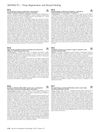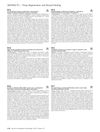Antifibrogenic Activities of Novel Vitamin D3 Analogs Are Dependent on VDR Expression in Human Fibroblasts
April 2019
in “
Journal of Investigative Dermatology
”

TLDR New vitamin D3 forms need the vitamin D receptor to reduce fibrosis in human cells.
The document from May 1, 2019, describes a study that investigated the antifibrogenic effects of novel vitamin D3 analogs on human fibroblasts. The study demonstrated that these analogs, including 20(OH)D3 and its metabolites, were effective in inhibiting fibroblast proliferation and reducing collagen production in cells from both black and white donors. The antifibrotic effects were further supported by the suppression of gene expressions related to fibrosis. However, when the Vitamin D receptor (VDR) gene was silenced in fibroblasts using shRNA transduction, the antiproliferative effects of the vitamin D3 derivatives were lost, indicating that the presence of VDR is essential for their antifibrogenic activities.






